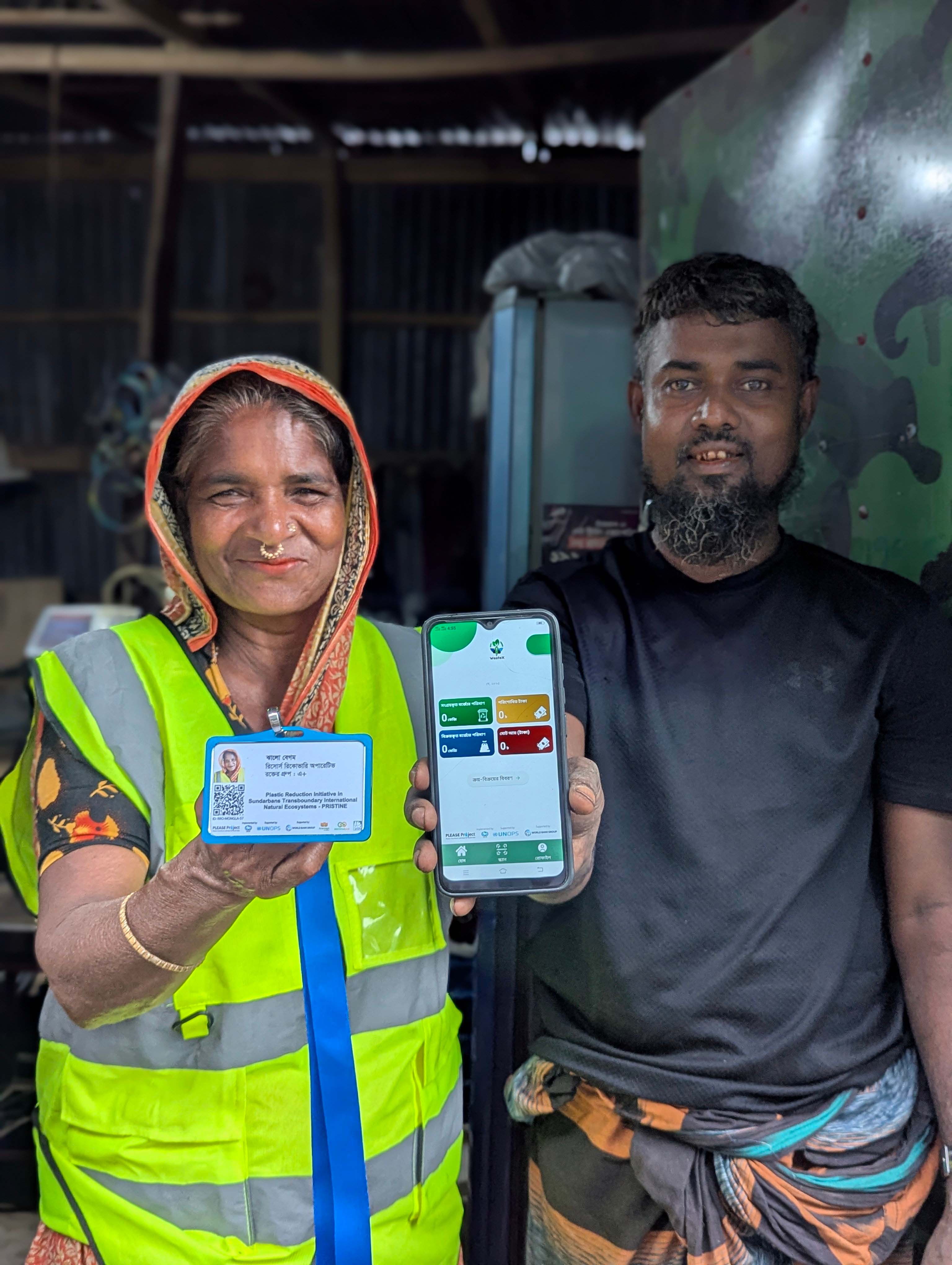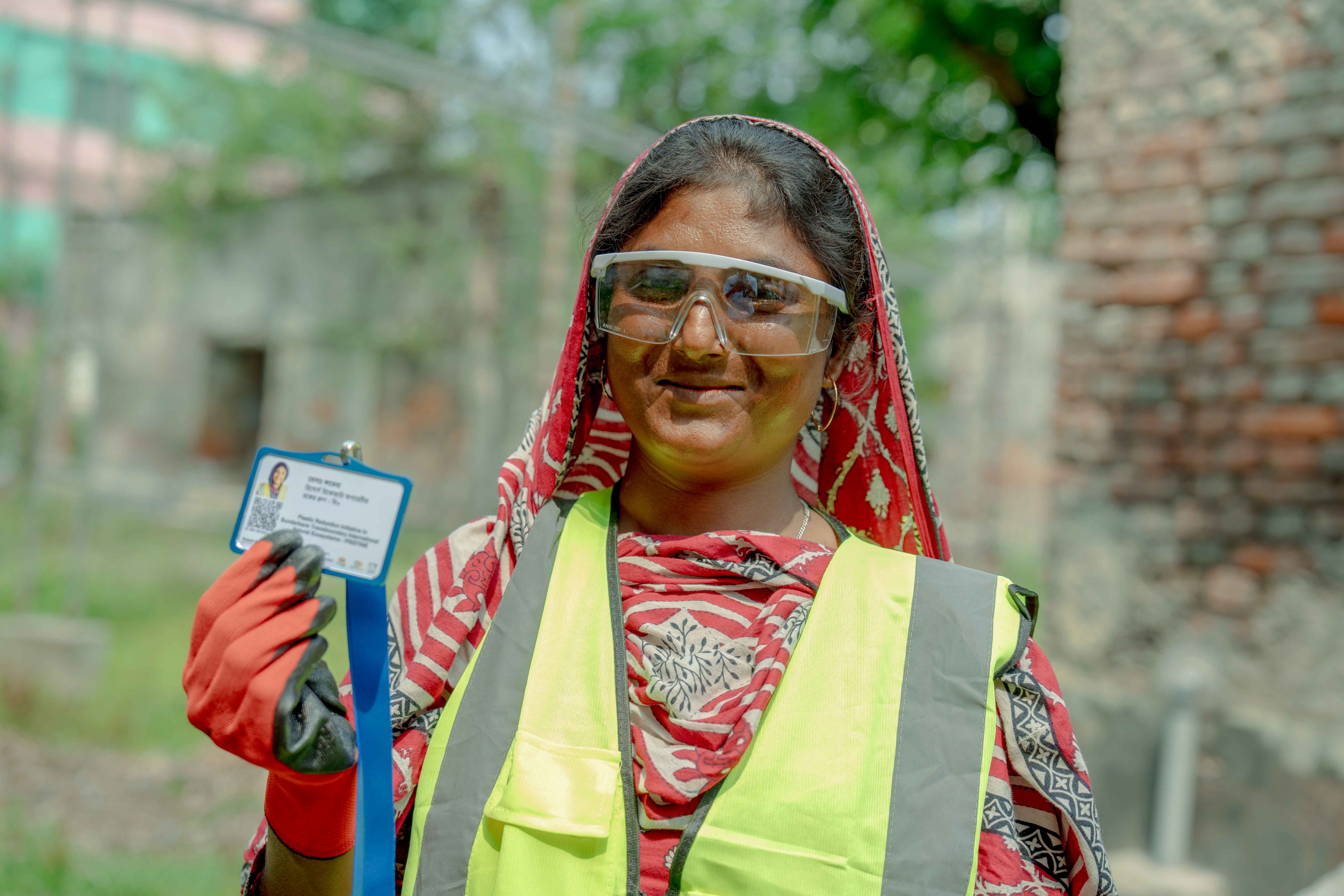In the Sundarbans’ upstream markets, a quiet digital shift is taking place. The PRISTINE project’s WasteX App is more than a tool for logging plastic, it is redefining how informal waste collectors are seen, paid, and protected. With QR-coded digital IDs, women and men once invisible in the system now hold verifiable work profiles, linking their labor to data that informs policy. In just nine months, 2.7 metric tons of single-use plastics were traced and recorded through WasteX, proving that local innovations can drive national goals on circular economy, gender equity, and environmental justice.
In one of the most ecologically sensitive regions of Bangladesh—the Sundarbans upstream—the PRISTINE project has piloted an innovation that fuses digital inclusion with circular economy principles. Arannayk Foundation, under the PRISTINE project, developed and deployed the WasteX App, a mobile-based solution designed to geospatially track, digitize, and optimize the single-use plastic (SUP) value chain while formalizing the role of informal waste collectors.
At the core of this system lies the integrated Digital ID Card—a scannable, QR-coded identification system issued to 102 waste collectors, 56 of whom are women (55%), and 75% from informal sectors. These cards are directly linked to individual profiles on the WasteX platform, capturing demographic details, collection history, transaction records, and location data in real time. This digital identity not only formalizes previously invisible labor but also provides a pathway for social recognition, income tracking, and future access to health and municipal services.
Launched across 10 key marketplaces, including Mongla Sadar (54 registered collectors), Baniashanta (20), and Digraj (10), the app enabled the traceable collection of 2,667.65 kilograms (2.7 metric tons) of SUPs between August 2024 and May 2025. Waste materials were logged in real time by type—LDPE, HDPE, PP, MLP—and securely stored under dry, segregated conditions. Every transaction was recorded via the app, with traders scanning the collector's Digital ID Card to ensure accountability, dynamic pricing, and fair compensation.
Technically built with Flutter and Laravel, hosted on AWS, and supported by a MySQL database, WasteX incorporates geo-fencing, CO₂ reduction tracking, and a user-friendly dashboard. Field supervisors could monitor collection activity and map hotspots, through embedded GIS tools.
 Happy waste collectors after app registration © AF/Kallol Sarkar
Happy waste collectors after app registration © AF/Kallol SarkarBeyond its technical capacity, the app created meaningful shifts in waste worker empowerment. For many, it was their first time having a verifiable work profile or identity card. These data points provided the foundation for policy recommendations, particularly around gender-inclusive planning and social protection for waste workers. Over 90% of registered users were actively logging transactions by the third month of rollout, thanks to tailored digital literacy training and weekly support from field supervisors.
WasteX also offered a new lens for municipal systems to see and support informal workers. By linking plastic recovery data with user profiles, the app created evidence for potential incentive schemes and performance-based safety nets. It laid the foundation for future integration into formal waste services and opened the door for connecting community-based recycling initiatives with national Extended Producer Responsibility (EPR) frameworks.
As the first digital SUP traceability system in Mongla, WasteX proved to be more than just an app—it became a symbol of systemic change. It aligned directly with Bangladesh’s Solid Waste Management Rules 2021 and the National Action Plan for Sustainable Plastic Management (2023–2030), demonstrating how localized digital solutions can deliver on national policy goals.
 ID cards formalize the informal waste collectors © AF/Arifur Rahman
ID cards formalize the informal waste collectors © AF/Arifur RahmanWasteX along with its digital formalization system - is a scalable and replicable model for data-driven, inclusive plastic waste management. Its success in Mongla offers a blueprint for other coastal and urban municipalities aiming to modernize their waste management systems while upholding environmental justice, gender equity, and community-led innovation.
Before, I was invisible. Now, I have an ID, I get paid fairly, and people know what I do matters.
- Gita Rani Das, Waste collector at Mongla Sadar market
This is the power of digital identity—when rooted in local realities, backed by technology, and led by the people it aims to serve.
Comments